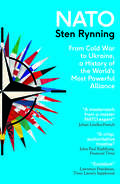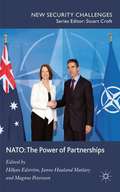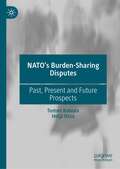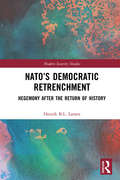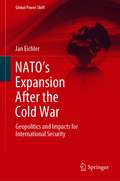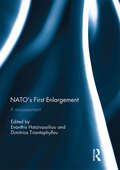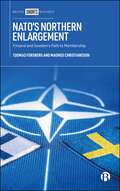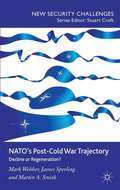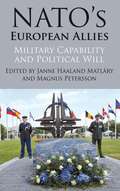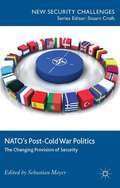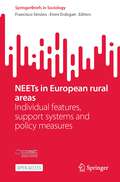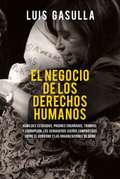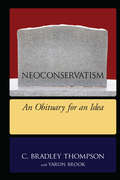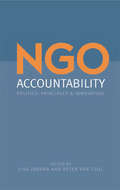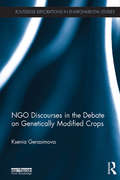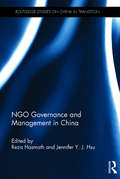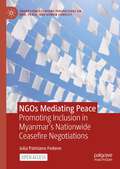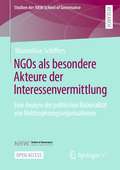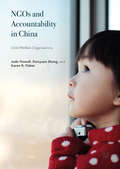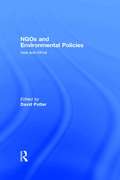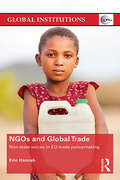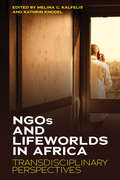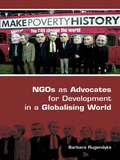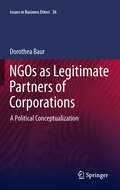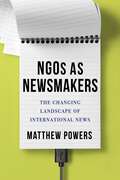- Table View
- List View
NATO: From Cold War to Ukraine, a History of the World's Most Powerful Alliance
by Sten RynningA wide-ranging new history of NATO, from its origins to the present day—published for the alliance’s seventy-fifth anniversary For seven decades, NATO’s stated aim has been the achievement of world peace—but playing great power politics always involves conflict. Russia’s war on Ukraine and on Europe’s security order puts the alliance under threat, but also demonstrates why transatlantic cooperation is so necessary. But how did NATO get to where it is today, and what does its future hold? In this incisive new account, Sten Rynning traces the full history of the North Atlantic Treaty Organisation from its origins to the present. Across its seventy-five years, NATO has navigated the twists and turns of Cold War diplomacy and nuclear deterrence, and has grown its membership. The alliance has become a guarantor of peace, but Rynning explores how its complex inner workings alongside Russian and Chinese opposition are now shaping its direction. At a time of strategic competition and geopolitical upheaval, Rynning offers us a clear-sighted account of the alliance’s intriguing history—and asks what its ambitions might be for the future.
NATO: The Power of Partnerships
by H�kan Edstr�m Janne Haaland Matlary Magnus PeterssonNATO has many European and global partner countries. The political and military utility of all these partnerships is clear; they 'provide' more security than they 'consume'. But the utility for NATO of partners also changes over time. This book scrutinizes these partnerships, both from a NATO perspective and from that of its partners.
NATO’s Burden-Sharing Disputes: Past, Present and Future Prospects
by Tommi Koivula Heljä OssaThis book states that burden-sharing is one of the most persisting sources for tension and disagreement within NATO (North Atlantic Treaty Organisation). It also belongs to one of the most studied issues within NATO with distinguishable traditions and schools of thought. However, this pertinent question has been rarely discussed extensively by academics. The key idea of the book is to make burden-sharing more understandable as a historical, contemporary and future phenomenon. The authors take a comprehensive look at what is actually meant with burden-sharing and how it has evolved as a concept and a real-life phenomenon through the 70 years of NATO’s existence.
NATO’s Democratic Retrenchment: Hegemony After the Return of History (Modern Security Studies)
by Henrik B.L. LarsenExploring NATO’s post-Cold War determination to support democracy abroad, this book addresses the alliance’s adaptation to the new illiberal backlashes in Eastern Europe, the Western Balkans and Afghanistan after the alleged ‘return of history’. The book engages the question of what has driven NATO to pursue democratisation in face of the significant region-specific challenges and what can explain policy expansion or retrenchment over time. Explaining NATO’s adaptation from the perspective of power dynamics that push for international change and historical experience that informs grand strategy allows wider inferences not only about democratisation as a foreign policy strategy but also about the nature of the transatlantic alliance and its relations with a mostly illiberal environment. Larsen offers a theoretical conception of NATO as a patchwork of one hegemonic and several great power interests that converge or diverge in the formulation of common policy, as opposed to NATO as a community of universal values. This volume will appeal to researchers of transatlantic relations, NATO’s functional and geographical expansion, hegemony and great power politics, democracy promotion, lessons of the past, (Neoclassical) Realism, alliance theory, and the crisis of the liberal world order.
NATO’s Expansion After the Cold War: Geopolitics and Impacts for International Security (Global Power Shift)
by Jan EichlerThis book analyses the expansion of The North Atlantic Treaty Organization (NATO) into the post-Soviet space after the end of the Cold War. Based on an extensive analysis of the literature and government documents, including doctrines, statements and speeches by the most influential decision-makers and other actors, it sheds new light on the geopolitical and geostrategic context of the expansion of the military alliance, and assesses its impact on international security relations in Europe. The first chapter introduces readers to the neo-realist approach and develops the methodological basis of the book. The following chapters provide a historical overview of the causes and consequences of two waves of eastward NATO enlargement. Special attention is paid to the annexation of the Crimea and to Russian hybrid-asymmetric warfare. Finally, thirty years after the end of the Cold War, the book notes a disturbing return to militarization in international security relations. To counter this process, the author calls for a reduction of current international tensions and a new policy of détente.
NATO’s First Enlargement: A Reassessment
by Evanthis Hatzivassiliou Dimitrios TriantaphyllouThis volume discusses the entry of Greece and Turkey to NATO in 1952 from the perspective of history and international relations. The chapters were originally collected in 2012 to mark the occasion of the sixtieth anniversary of the accession of the two states to NATO. The focus is not on the diplomatic/political events that led to the accession (a subject which has already been extensively discussed in the available bibliography), but expands on a reassessment of this event for the two states as well as for the Balkans, covering aspects of the wider post-war period and providing perspectives for the policies of Turkey, Greece and NATO until the present day. This book was originally published as a special issue of Southeast European and Black Sea Studies.
NATO’s Northern Enlargement: Finland and Sweden’s Path to Membership
by Tuomas Forsberg Magnus ChristianssonEurope’s security environment was fundamentally altered by Russia’s invasion of Ukraine which gave fresh impetus to states to apply for NATO membership. This book, written by leading experts on European defence, analyses NATO’s northern expansion, detailing the unique dynamics that forged Finland and Sweden’s path to NATO membership. The book uses resources in Swedish, Finnish and English to offer a balanced study of both political and military aspects of NATO enlargement. Exploring the pressing issues that NATO will need to tackle, particularly in Northern Europe, the book considers the potential repercussions the newest round of NATO enlargement will have on European and global security.
NATO’s Post-Cold War Trajectory
by Martin A. Smith James Sperling Mark WebberTwo decades since the watershed of the Cold War, this book investigates NATO's staying power. This book investigates how the Alliance has adapted and managed to attend to new roles and purposes through the lens of International Relations theory. The Alliance will continue, but will remain subject to ongoing crises and challenges of change.
NATO�s European Allies
by Janne Haaland Matlary Magnus PeterssonThe question of burden sharing has always been important in NATO with an acute relevance today as the US will cut its defence budget over a ten-year period and is no longer automatically willing to lead military operations. This volume considers Europe's role in political force for the future exploring eight European case studies.
NATO�s Post-Cold War Politics
by Sebastian MayerThis collection is the first book-length study of NATO's bureaucracy and decision-making after the Cold War and its analytical framework of 'internationalization' draws largely on neo-institutionalist insights.
NEETs in European rural areas: Individual features, support systems and policy measures (SpringerBriefs in Sociology)
by Francisco Simões Emre ErdoganThis open access book constitutes a transnational and multidisciplinary inquiry of the most pressing challenges faced by young people Not in Employment, nor in Education or Training (NEET) in rural areas across Europe. . Rural NEETs are one of the most invisible segments of the youth population, in spite of the fact that the percentage of NEETs is higher in the countryside, compared to those in suburban and urban areas across the EU and many of the Southern and Eastern European countries. This book identifies and analyses different factors that may contribute to or hamper youth social development and social inclusion. Among them are main individual features of rural NEETs, the quality and characteristics of rural NEETs' informal social networks and support, the singularities of formal and non-formal education in rural areas and how they shape the transition from school to work, the role of employment services in providing adequate institutional support, the importance of policy package designor the role of new paradigms of rural development to uphold vulnerable young people in the European countryside . The contributions offered in this book provide a new model of analysis and comprehension of rural NEETs' personal development and social inclusion. This book therefore establishes the state of the art regarding available knowledge on rural NEETs, and represents an inspirational resource for new research agendas on the subject of vulnerable rural youth in Europe. This book also forms the policy design in areas such as education, employment, and social welfare in rural areas.
NEGOCIO DE LOS DERECHOS HUMANOS (EBOOK)
by Luis GasullaFlujo desbocado de fondos públicos, tráfico de influencias y tergiversaciones simbólicas e ideológicas: de eso está hecha la alianza entre el poder y los Derechos Humanos en la Argentina K. No queda del todo claro cómo fue que el líder de una administración que jamás recibió a estos organismos durante años y años de intendencias y gobernaciones patagónicas, terminó embanderado como caudillo en la defensa de los DDHH. Luis Gasulla señala que la matriz de eso que se conoce como #El Relato# está allí mismo: en una bandera que pasó a ser fundamento de la hegemonía política de los Kirchner. Sólo que junto al dinero derivado hacia Madres de Plaza de Mayo, empezaron a reproducirse también los escándalos. Sergio Schoklender, uno de los protagonistas de este libro, no hubiese podido transformarse en lo que llegó a ser sin la complicidad de un sistema conformado por los Poderes Ejecutivo, Legislativo y Judicial, que decidieron mirar hacia otro lado. Se archivaron denuncias, se silenciaron protestas y se continuaron subsidiando obras sin importar cómo se usaba el dinero. El discurso del #juicio y castigo# y la reescritura del pasado parecían servir para tapar cualquier desaguisado, pero la ruptura escandalosa entre Hebe de Bonafini y Sergio Schoklender indica que no es así. Y que las manchas en el pañuelo más significativo de la historia nacional sólo pueden multiplicarse.
NEOCONSERVATISM: An Obituary for an Idea
by Yaron Brook C. Bradley ThompsonAn obituary - so soon! Surely the reports of neoconservatism's death are greatly exaggerated. C. Bradley Thompson has written (with Yaron Brook) the most comprehensive and original analysis of neoconservatism yet published and in the process has dealt it a mortal blow. Neoconservatism reveals publicly for the first time what the neocons call their "philosophy of governance" - their plan for governing America. This book explicates the deepest philosophic principles of neoconservatism, elucidates the intellectual relationship between the political philosopher Leo Strauss and neoconservative political actors, and provides a trenchant critique of neoconservatism from the perspective of America's founding principles. The theme of this timely book will shake up the intellectual salons of both the Left and Right: Neoconservatism as a species of anti-Americanism. What makes this book so compelling is that Thompson actually lived for many years in the Straussian/neoconservative intellectual world. Neoconservatism therefore fits into the 'breaking ranks' tradition of scholarly criticism and breaks the mold when it comes to informed, incisive, nonpartisan critique of neoconservative thought and action.
NGO Accountability: "Politics, Principles and Innovations"
by Lisa Jordan Peter Van TuijlAs the fastest growing segment of civil society, as well as featuring prominently in the global political arena, NGOs are under fire for being 'unaccountable'. But who do NGOs actually represent? Who should they be accountable to and how? This book provides the first comprehensive examination of the issues and politics of NGO accountability across all sectors and internationally. It offers an assessment of the key technical tools available including legal accountability, certification and donor-based accountability regimes, and questions whether these are appropriate and viable options or attempts to 'roll-back' NGOs to a more one-dimensional function as organizers of national and global charity. Input and case studies are provided from NGOs such as ActionAid, and from every part of the globe including China, Indonesia and Uganda. In the spirit of moving towards greater accountability the book looks in detail at innovations that have developed from within NGOs and offers new approaches and flexible frameworks that enable accountability to become a reality for all parties worldwide.
NGO Discourses in the Debate on Genetically Modified Crops (Routledge Explorations in Environmental Studies)
by Ksenia GerasimovaThe development and use of genetically modified organisms (GMOs) has been a contentious topic for the last three decades. While there have been a number of social science analyses of the issues, this is the first book to assess the role of Non-Governmental Organizations (NGOs) in the debate at such a wide geographic scale.The various positions, for and against GMOs, particularly with regard to transgenic crops, articulated by NGOs in the debate are dissected, classified and juxtaposed to corresponding campaigns. These are discussed in the context of key conceptual paradigms, including nature fundamentalism and the organic movement, post-colonialism, food sovereignty, anti-globalisation, sustainability and feminism. The book also analyses how NGOs interpret the debate and the persuasive communication tactics they use. This provides greater understanding of the complexity of negotiations in the debate and explains its specific features such as its global scope and difficulty in finding compromises. The author assesses the long-term interests of various participants and changes in perceptions of science and in public communication as a result. Examples of major NGOs such as Greenpeace, Oxfam and WWF are included, but the author also provides new research into the role of NGOs in Russia.
NGO Governance and Management in China (Routledge Studies on China in Transition)
by Reza Hasmath Jennifer Y. HsuAs China becomes increasingly integrated into the global system there will be continuing pressure to acknowledge and engage with non-governmental organizations (NGOs). Suffice to say, without a clear understanding of the state’s interaction with NGOs, and vice versa, any political, economic and social analysis of China will be incomplete. This book provides an urgent insight into contemporary state-NGO relations. It brings together the most recent research covering three broad themes, namely the conceptualizations and subsequent functions of NGOs; state-NGO engagement; and NGOs as a mediator between state and society in contemporary China. The book provides a future glimpse into the challenges of state-NGO interactions in China's rapidly developing regions, which will aid NGOs strategic planning in both the short- and long-term. In addition, it allows a measure of predictability in our assessment of Chinese NGOs behaviour, notably when they eventually move their areas of operation from the domestic sphere to an international one. The salient themes, concepts, theories and practice discussed in this book will be of acute interest to students, scholars and practitioners in development studies, public administration, and Chinese and Asian politics. Reza Hasmath is a Lecturer in Chinese Politics at the University of Oxford, UK, and an Associate Professor in Political Science at the University of Alberta, Canada. His research looks at state-society relationships, the labour market experiences of ethnic minorities, and development theories and practices. Jennifer Y.J. Hsu is an Assistant Professor in Political Science at the University of Alberta, Canada. Her recent publications include a co-authored book HIV/AIDS in China: The Economic and Social Determinants (Routledge, 2011), and a co-edited book The Chinese Corporatist State: Adaption, Survival and Resistance (Routledge, 2012).
NGOs Mediating Peace: Promoting Inclusion in Myanmar’s Nationwide Ceasefire Negotiations (Twenty-first Century Perspectives on War, Peace, and Human Conflict)
by Julia Palmiano FedererThis book explores the role of nongovernmental mediators in promoting “inclusive peace” to negotiating parties in Myanmar’s Nationwide Ceasefire Agreement (NCA) negotiations from 2011-2015. The influx of NGO mediators directly engaging with the negotiating parties and promoting the inclusivity norm coupled with the salience of discourse around “all-inclusiveness” at the end of the NCA process forms a puzzle around the agency that NGO mediators wield in influencing political outcomes, despite their lack of political and material leverage.The author argues that NGO mediators can effectively promote norms, using mediation processes as a site of norm diffusion. Bespoke international conflict resolution NGOs have become key mediation actors, within the last three decades through creating the niche world of “private diplomacy” and acting as "norm entrepreneurs" at the same time. As informal third parties, these NGO mediators directly engage with politically sensitive actors or convene unofficial peace talks. As NGOs, they are part of an epistemic community of mediation practice, professionalizing the field and producing knowledge on what peace mediation is and what it ought to be. This dual identity as both NGOs and mediators nicely sets them up with a unique agency to promote and diffuse norms. These norms often reflect the liberal peacebuilding paradigm promoted from the Global North, such as inclusion, gender equality and transitional justice, with the view that these norms are not ends in themselves but as necessary ingredients for effective mediation.The book further questions whether NGOs should promote norms in the first place. The outcome of the NCA process presents a critical and cautionary tale of promoting a presumed universal norm into a given locale and expecting a certain outcome without understanding how an external norm interacts with existing normative frameworks. The book illustrates that while NGO mediators do possess the “normative agency” to effectively promote norms to negotiating parties, my empirical research analyses how their promotion of the “inclusivity” norm to the negotiating parties in Myanmar’s NCA paradoxically resulted in exclusionary outcomes: only half of the armed groups in the ethnic armed groups’ negotiating bloc signed, and civil society was effectively crowded out from meaningful participation despite lofty rhetoric.This is an open access book.
NGOs als besondere Akteure der Interessenvermittlung: Eine Analyse der politischen Rationalität von Nichtregierungsorganisationen (Studien der NRW School of Governance)
by Maximilian SchiffersIn diesem Open-Access-Buch thematisiert Maximilian Schiffers die Rolle von NGOs als besondere Akteure der Interessenvermittlung. Als Leitfrage untersucht er, wie verschiedene Typen von NGOs im Rahmen politischer Prozesse agieren. Mit einer explorativen und qualitativen Forschungsstrategie vergleicht der Autor fünf systematisch ausgewählte NGOs. Die theoretische Perspektive basiert auf einem Dreieck der Handlungsrationalität (Unterstützungs-, Einfluss- und Reputationslogik) für NGO-Handeln im Kontext moderner Governance-Strukturen. Die Ergebnisse geben einen differenzierten Einblick in die Strategie- und Handlungspraxis von NGOs. Die Spannweite der Profilausprägungen zeigt, dass die Organisationen aus einem vielschichtigen Strategieportfolio mit Schwerpunkten aus Expertise-, Kampagnen-, Mitgliedschaft- und Plattformtypen wählen können. Der Autor erschließt praxisorientierte Bausteine moderner Interessenvermittlung, welche die NGO-spezifischen Besonderheiten betonen.
NGOs and Accountability in China: Child Welfare Organisations
by Jude Howell Xiaoyuan Shang Karen R. FisherThis book investigates how NGOs in authoritarian states, such as China, craft accountability and legitimacy to ensure their survival. It explores this through the lens of child welfare organisations from 2007 to 2017. The authors provide a fresh approach to accountability that is more attuned to the particular conditions of authoritarianism. The project explores the effects of power relations in shaping the hierarchies of accountability and participation that emerge and the attention given to different voices such as those of donor, government, and users. Essential reading for researchers and policy makers interested in development, NGO, social policy, political science, and child welfare studies.
NGOs and Environmental Policies: Asia and Africa
by David PotterCovering the work of non-governmental organizations in trying to change the environmental policies of governments and business organizations, this study looks at field research in Asia and Africa, and relates it to theoretical issues in the academic field.
NGOs and Global Trade: Non-state voices in EU trade policymaking (Global Institutions)
by Erin HannahIn a deeply iniquitous world, where the gains from trade are distributed unevenly and where trade rules often militate against progressive social values, human health, and sustainable development, NGOs are widely touted as our best hope for redressing these conditions. As a critical voice of the poor and marginalized, many are engaged in a global struggle for democratic norms and social justice. Yet the potential for NGOs to bring about meaningful change is limited. This book examines whether improvements in participatory opportunities for progressive NGOs results in substantive and normative policy change in one of the major trading powers, the European Union. Hannah advances a constructivist account of the role of NGOs in the EU’s trade policymaking process. She argues that NGOs have been instrumental in providing education, raising awareness, and giving a voice to broader societal concerns about proposed trade deals, both when they take advantage of formal participatory opportunities and when they protest from the streets and in the media. However, the book also highlights how NGO inputs are mediated by the social structure of global trade governance. Epistemes—the background knowledge, ideological and normative beliefs, and shared assumptions about how the world works—determine who has a voice in global trade governance. Showing how NGOs succeed only when their advocacy conforms broadly to the dominant episteme, this book will be of value to scholars and students with an interest in NGOs and international trade negotiations. It will also be of interest to policymakers, national trade negotiators, government departments, and the trade policy community.
NGOs and Lifeworlds in Africa: Transdisciplinary Perspectives
by Melina C. Kalfelis Kathrin KnodelNon-governmental organizations (NGOs) have become ubiquitous in the development sector in Africa and attracting more academic attention. However, the fact that NGOs are an integral part of the everyday lives of men and women on the continent has been overlooked thus far. In Africa, NGOs are not remote, but familiar players, situated in the midst of cities and communities. By taking a radical empirical stance, this book studies NGOs as a vital part of the lifeworlds of Africans. Its contributions are immersed in the pasts, presents and futures of personal encounters, memories, decision-making and politics.
NGOs as Advocates for Development in a Globalising World
by Barbara RugendykeThis book traces the recent growth in NGO advocacy. Barbara Rugendyke presents empirical findings about the impacts of NGO advocacy activity on the policies and practices of global and regional institutions. The research reveals the mixed successes of advocacy as a strategy for addressing the ongoing causes of poverty in developing nations. Case studies illustrate the advocacy work of Australian NGOs, of British NGOs policies about engaging with multinationals, of Oxfam International’s advocacy directed at World Bank policies and NGO advocacy in the Mekong Region. Adopting an interdisciplinary approach, the mixed successes of advocacy as a strategy used by NGOs in attempting to address the ongoing causes of poverty in developing nations are examined. This volume is a useful aid to researchers, students and lecturers and to development practitioners interested in advocacy as a development strategy.
NGOs as Legitimate Partners of Corporations
by Dorothea BaurThe interaction between corporations and non-governmental organizations (NGOs) has become an important topic in the debate about corporate social responsibility (CSR). Yet, unlike the vast majority of academic work on this topic, this book explicitly focuses on clarifying the role of NGOs, not of corporations, in this context. Based on the notion of NGOs as political actors it argues that NGOs suffer from a multiple legitimacy deficit: they are representatives of civil society without being elected; the legitimacy of the claims they raise is often controversial; and there are often doubts regarding the legitimacy of the behaviour they exhibit in putting forward their claims. Set against an extended sphere of political action in the postnational constellation this book argues that the political model of deliberative democracy provides a meaningful conceptualization of NGOs as legitimate partners of corporations and it develops a conceptual framework that specifically allows distinguishing legitimate partner NGOs from two related actor types with whom they share certain characteristics but who differ with respect to their legitimacy. These related actor types are interest groups on the one hand and activists on the other hand. In conclusion it argues that a focus on the behaviour of NGOs is most meaningful for distinguishing them from interest groups and activists.
NGOs as Newsmakers: The Changing Landscape of International News (Reuters Institute Global Journalism Series)
by Matthew PowersAs traditional news outlets’ international coverage has waned, several prominent nongovernmental organizations have taken on a growing number of seemingly journalistic functions. Groups such as Amnesty International, Human Rights Watch, and Médecins Sans Frontières send reporters to gather information and provide analysis and assign photographers and videographers to boost the visibility of their work. Digital technologies and social media have increased the potential for NGOs to communicate directly with the public, bypassing traditional gatekeepers. But have these efforts changed and expanded traditional news practices and coverage—and are there consequences to blurring the lines between reporting and advocacy?In NGOs as Newsmakers, Matthew Powers analyzes the growing role NGOs play in shaping—and sometimes directly producing—international news. Drawing on interviews, observations, and content analysis, he charts the dramatic growth in NGO news-making efforts, examines whether these efforts increase the organizations' chances of garnering news coverage, and analyzes the effects of digital technologies on publicity strategies. Although the contemporary media environment offers NGOs greater opportunities to shape the news, Powers finds, it also subjects them to news-media norms. While advocacy groups can and do provide coverage of otherwise ignored places and topics, they are still dependent on traditional media and political elites and influenced by the expectations of donors, officials, journalists, and NGOs themselves. Through an unprecedented glimpse into NGOs’ newsmaking efforts, Powers portrays the possibilities and limits of NGOs as newsmakers amid the transformations of international news, with important implications for the intersections of journalism and advocacy.
